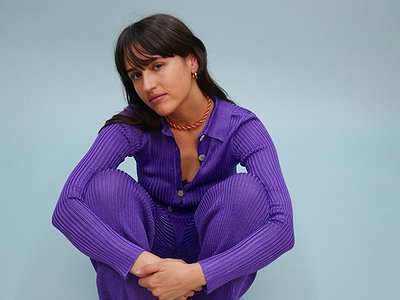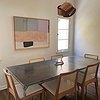Name: Rozzi
Nationality: American
Occupation: Vocalist, songwriter
Current Release: Rozzi's Hymn for Tomorrow EP is available via BMG.
Recommendations: I just re read "East Of Eden" and it’s still my favorite book. And my brilliant sister-in-law Caroline Hurley made this piece for my apartment that I love:

If you enjoyed this interview with Rozzi, visit her on Facebook and Instagram to stay up to date with her work. Or head straight to her official website for a deeper look at her work.
When did you start writing/producing music - and what or who were your early passions and influences? What was it about music and/or sound that drew you to it?
I was writing music before I knew what that meant.
I have flashbacks to preschool, walking around making up songs while the other kids played together. I always liked being alone with my music, it triggered some part of my imagination that I still like to live in ...
Somewhere I can visualize all the things I want, and feel them as if they’re really happening.
For most artists, originality is preceded by a phase of learning and, often, emulating others. What was this like for you: How would you describe your own development as an artist and the transition towards your own voice?
I am nothing without the singers I emulated and mimicked. The list of who I wanted to sound like as a kid is endless: Bjork, Christina Aguilera, Paul McCartney, Eva Cassidy. Then came the artists who I wanted to be. Lauryn Hill, Amy Winehouse. I used to memorize Aretha Franklin albums note for note on winter breaks from school. And I still watch live Beyoncé videos backstage when I’m nervous for a show.
I’ve always felt like, if I can sing everything everyone else can, then I have options. Then I’ll be able to sing whatever feels right emotionally, I won’t be tethered down by a lack of range or agility.
How do you feel your sense of identity influences your creativity?
My biggest goal is to be my authentic self. And the only way to do that is to really know myself! So identity and creativity go hand in hand.
What were your main creative challenges in the beginning and how have they changed over time?
When I was starting off, I had a sense of who I was, but I didn’t know how to be that artist, how to execute the vision I had. The only way for me to get to that point, was experience.
Now I’ve lived enough to know what I want and who I am and I feel very comfortable asking for it.
As creative goals and technical abilities change, so does the need for different tools of expression, be it instruments, software tools or recording equipment. Can you describe this path for you, starting from your first studio/first instrument? What motivated some of the choices you made in terms of instruments/tools/equipment over the years?
I am the least tech savvy person - I really wish I was inspired by technology but I’m not! I guess that’s caused me to keep things simple. I’ll play, just me on piano with a single mic, or me singing with a couple background vocalists.
My focus is on the music and I want to think about the logistics as little as possible.
Have there been technologies or instruments which have profoundly changed or even questioned the way you make music?
My cell phone! I write lyrics on the notes app and record melodies on the voice apps. I don’t know what I’d do without it.
Collaborations can take on many forms. What role do they play in your approach and what are your preferred ways of engaging with other creatives through, for example, file sharing, jamming or just talking about ideas?
I collaborate on everything. I like having other ideas in a room and letting everyone bring their strengths to the table.
The one thing I really like to do myself is write a first draft of lyrics. My songs are too personal, and I’m too shy a person to not go in with something fairly thought out.
Take us through a day in your life, from a possible morning routine through to your work, please. Do you have a fixed schedule? How do music and other aspects of your life feed back into each other - do you separate them or instead try to make them blend seamlessly?
I’m obsessed with my schedule, it actually couldn’t be less rock and roll.
I plan my days by the hour because I really love habit and repetition, but I’ve chosen a job where there’s little of that. My afternoons are when I write, practice, and do whatever work I have to do. But the mornings usually consist of waking up early, doing some of my favorite singing breaths, getting caffeinated and writing some poems or song concepts, exercising, and going on a walk.
Can you talk about a breakthrough work, event or performance in your career? Why does it feel special to you? When, why and how did you start working on it, what were some of the motivations and ideas behind it?
My song “Uphill Battle” was the first of a new kind of song for me - one where I was really vulnerable and specific. I had felt that song inside me for a long time but it wasn’t until I had more life and writing experience that I could really execute it. I said what I meant more than I ever had before and I think I’ve written differently ever since.
There are many descriptions of the ideal state of mind for being creative. What is it like for you? What supports this ideal state of mind and what are distractions? Are there strategies to enter into this state more easily?
I need to be in shape - writing all the time. I need to be feeling new feelings - living my life in an adventurous way. And I need to be getting a lot of input - listening to new music, watching and taking other art in.
Music and sounds can heal, but they can also hurt. Do you personally have experiences with either or both of these? Where do you personally see the biggest need and potential for music as a tool for healing?
Songs are time machines - that’s how I’ve been hurt by music. By being transported back to a time in my life that was hard or that was great but is over. It’s like a map of our lives.
I think the healing is most effective when people see themselves in the music they listen to - when a song can articulate an emotion and carry the listener through it. I’ve never felt so seen as I did listening to “Ex Factor” by Lauryn Hill after a break up.
Our sense of hearing shares intriguing connections to other senses. From your experience, what are some of the most inspiring overlaps between different senses - and what do they tell us about the way our senses work?
If music is a time machine, so is scent. I’ve smelled a chapstick I used in middle school and been taken back 10 years! To me that means art is the best way to capture memories.
Or, to say it in a more dramatic way, art is how we are immortal.
Art can be a purpose in its own right, but it can also directly feed back into everyday life, take on a social and political role and lead to more engagement. Can you describe your approach to art and being an artist?
I think it’s an artists job to reflect the world they live in. That world can be as big as a political movement, or as small as a relationship with one person.
My goal is only to authentically capture how I feel - whether that’s about a fight with my boyfriend or experiencing the effects of Climate Change.
What can music express about life and death which words alone may not?
Sorry to be cute but I’m not sure I have the words to express it! It’s that flying feeling you get when you listen to a song, or that sinking feeling when one says exactly what you meant to say but couldn’t. Again, art makes us immortal!


